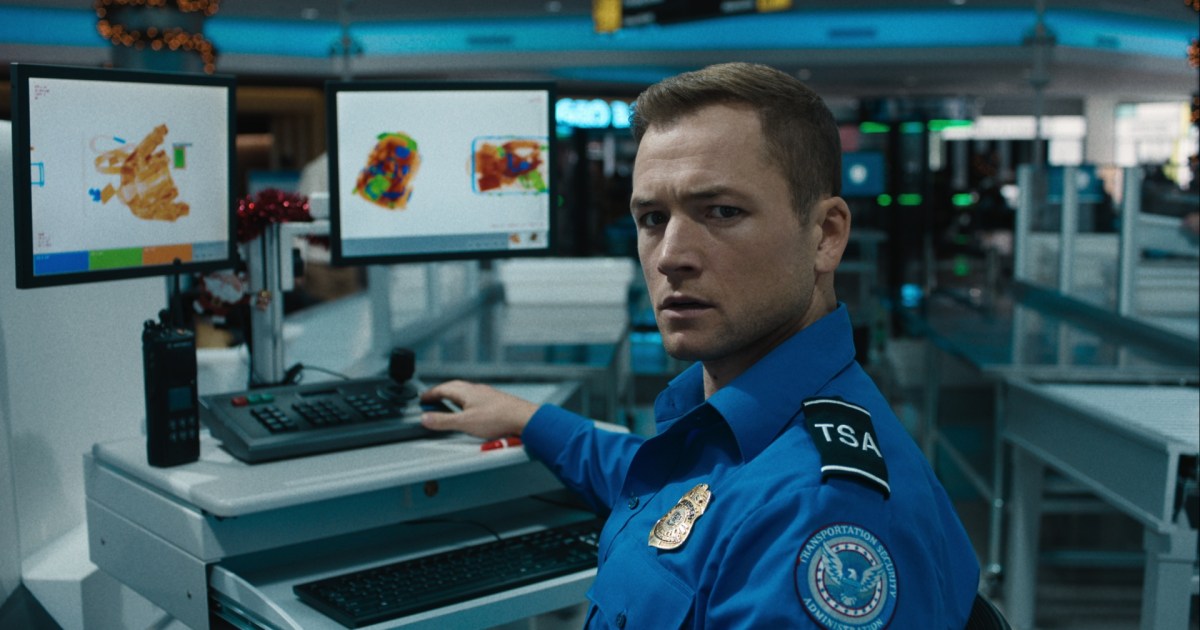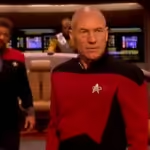Jaume Collet-Serra is well-versed in the mid-budget action thriller. Since 2011, Collet-Serra has made several smart, gripping thrillers, from Unknown and Non-Stop to Run All Night and The Commuter. All four are high-concept movies with memorable settings, heart-stopping action, and a pissed-off Liam Neeson. Collet-Serra, having helmed two big-budget blockbusters — Jungle Cruise and Black Adam — returns to his signature genre (albeit without Neeson) with Netflix’s Carry-On.
It’s Christmas Eve, and TSA Agent Ethan Kopek (Taron Egerton) is about to work during one of the airport’s busiest days. All is well until Ethan finds a mysterious earpiece in one of the security bins. On the other end is a mysterious traveler (Jason Bateman), who demands that Ethan let a dangerous bag slip through TSA. If Ethan disobeys an order, innocent people will die, including his pregnant girlfriend Nora (Sofia Carson). Unwilling to abide by the rules, Ethan embarks on an airport-wide manhunt to find the traveler and stop the bag from reaching the plane.
In a conversation with Digital Trends, Collet-Serra pondered Carry-On’s status as a Christmas movie, explained his return to the mid-budget thriller, and how he set out to make a more grounded action movie.
Note: This article has been edited for length and clarity. The interview includes spoilers.
Digital Trends: How are you doing today?
Jaume Collet-Serra: I’m good, good. Tired from shooting.
Cliffhanger, right? How’s that been? I think it was first announced last month.
Yeah, I don’t know. I honestly don’t know when things are announced. I’m too busy to pay attention.
That’s a good problem to have.
Yeah, yeah.
First question. I want to end the debate, and I’m sure you might have gotten this before. Is Carry-On a Christmas movie?
It happens during Christmas, so yes. [laughs] Personally, I wasn’t much of a Christmas person, just like the character of Ethan, until I had kids. Now I really enjoy it, and I really like it, and I’m sure that the character of Ethan will go through the same evolution. And you embrace Christmas, right? In a weird way, the spirit of Christmas has grown in me as I was making this movie.
It’s been a while. My kids have grown older. We made the movie a couple of years ago, and so when I read the script, I felt like Christmas was just something in the background. As I was finishing the movie, I actually came to like it and embraced the fact that there’s something special when movies are defined in a place. Like defined by one location, one day, and one season. I’d rather make a Christmas movie than another holiday [movie]. It changes the attitudes of the characters. There’s music associated with it [Christmas]. There’s a certain wardrobe, and there are certain things … like the fact that we did it in L.A., where Christmas is not necessarily so obvious as in other places.
Right now I’m in Munich, and everything is snow, so everybody’s in the Christmas spirit already, even though we’re far away from it. In L.A., suddenly the lights pop on and things come in, but there are not a lot of physical changes. I think that made it interesting. That it [Christmas] was a presence, but it wasn’t an overwhelming presence. It’s not like you have snow and singing carols and all of that stuff.
I look at it Die Hard. It broke our brains. Everyone has to argue about it. I think it [Die Hard] is a Christmas movie. I also think Carry-On is a Christmas movie.
I think so. The difference is I don’t think Die Hard came out in the Christmas period. I think it came out in the summer.
Yeah. It came out in the summer but was filmed for Christmas.
For sure. Exactly. I think it’s a Christmas movie if it happens at Christmas. I think that defines it, not when it came out.
All right, it’s settled. Your last two movies, Jungle Cruise and Black Adam, were more big-budget, IP-driven blockbusters. Carry-On, I would say, is more similar to some of the mid-budget action thrillers that you’ve become famous for. Was that a deliberate decision to return to this style of filmmaking?
Yeah, very deliberate. Obviously, movies don’t just happen right away; there’s a prep and a development process. Carry-On had been on my radar for a while, even when I was making these other movies. I will always be in that thriller-horror space that I can go back and forth from. I think I will always be in that space, and I like it.
I’m just trying to figure out ways that it feels fresh for the new audience, and trying to find new characters in this movie, like Ethan. He’s someone who is dealing with some realities a lot of people are facing today, like a job that they necessarily don’t love. There’s not a lot of passion, but there are the challenges of a stable relationship and potentially growing family and a character that has never been tested before. He doesn’t know his full potential. I think that a lot of people can relate to that. They think, “Oh. I could do better, but I’ve never had the opportunity, or I’ve never been in those situations.”
Other than the concept of a TSA guy whose loved one gets threatened to let the bag go through, what was interesting to me was the idea of doing a thriller for a new generation with the things that are troubling them at this moment — relationship, job, aspirations, what the future looks like. This thriller is a pressure cooker to prove whether they [Ethan] are a diamond in the rough or they’re just rough [laughs] and going to crumble under the pressure. That was my thing where, like I said, I love the genre, and I’m always trying to find new ways to explore the genre.

With casting decisions, I know what’s going to stick out for a lot of people is Jason [Bateman] in the villainous role. He’s definitely veered more toward dramatic roles, especially with Ozark. That opening scene, the way you shoot it, sets the tone for the character. You barely see his face, and he rarely speaks. He comes across as a cold-blooded character. Take me through the process of that opening scene. Was it important for you to establish him as this nefarious character so that people forget they’re watching Jason Bateman, a famous comedic actor?
Yeah. I think villains are obviously very important in these kinds of movies, especially someone who is not seen a lot and is in the head of your main character. I definitely wanted somebody who was very intelligent. The character is very intelligent, and Jason is super intelligent. He can just do so much with so little. There is a definitive, overpowering logic and pragmatism that I think a bad guy needs to have. Where they’re not just going to do things for their sadistic nature or to try to prove anything. They do the bare minimum to get the maximum result.
You could see that in Jason. He has this persona where he can so easily go from comedy to drama, and he can just turn it quickly. It’s so interesting. You never know what’s going to happen next. He really gravitated to the character because we didn’t want it to be the mustache-twirling guy. He wanted him to be an ordinary guy. Somebody that could be at the airport, a normal person in the most underplayed way … And he can act like that, and then he can turn it as well. It’s just that ruthless, obvious pragmatism. I think it’s overpowering.

I get a sense from a lot of the thrillers you do that, yes, there’s action, but they almost feel like Agatha Christie novels. Is that how you approach the thriller — a mystery with action?
The level of action varies depending on the times. I think in my earlier work, the action was a little bit more like, “You need to kill the bad guy, say the line, and shoot him between the eyes.” And I think that all of us — Jason, Taron, and myself — were like, let’s just make it super grounded and realistic. If you receive a punch, you’re going to get a bruise. You’re not invincible. How many times have you held the gun? Have you shot a gun?
All of those things really bring the level of the action to a certain level that it can still be fun. You can still have a little action sequence in a back-sorting facility, which is impressive, but there’s only one punch that is thrown in that whole sequence. Having that in mind, what’s very important is the ticking clock.
What is the procedural part? I really enjoy procedurals. I want to learn about the world. I want to learn about the TSA. How do they figure out who has what in their bags? Once we show the audience the bag, we figure out how to get it in. You start turning it around on its head over and over again until you are following something that you didn’t know anything about five minutes ago. Now, you’re invested in every detail.
To do that, it’s important that I have a good ensemble cast that I care about as well. It’s not just people that come in with exposition, but they’re unique. I know what their dreams are, their aspirations, and all of that. That helps me build a little bit of the puzzle. You have fun watching it without feeling like you’re being fed all of this information.
Carry-On is now streaming on Netflix.
Read the full article here














